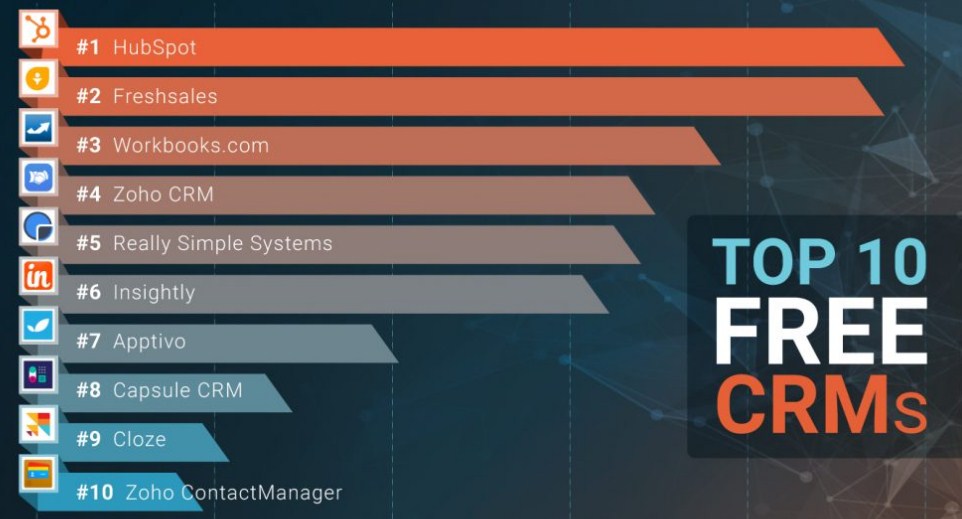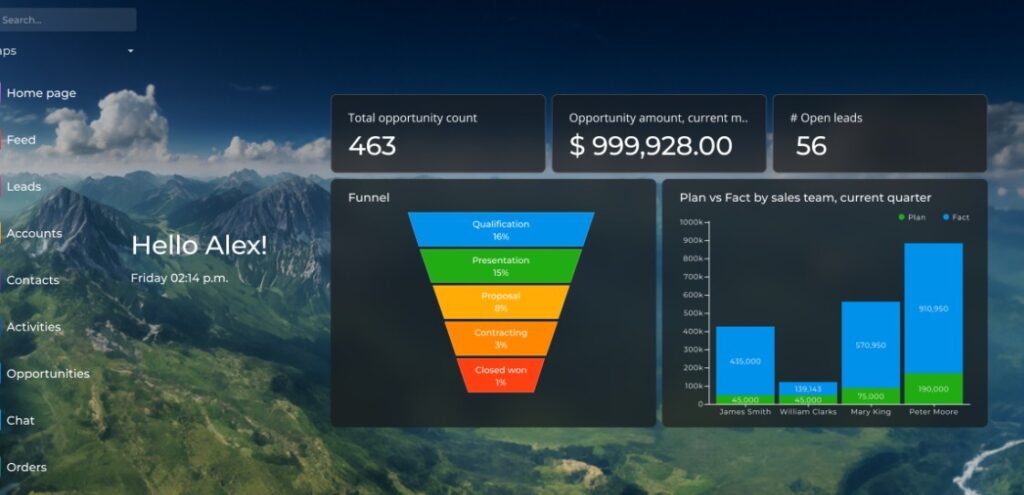Best CRM Tools List – Customer Relationship Management (CRM) tools have become an integral part of business success in the digital age. Whether you’re a small business owner or part of a large enterprise, CRM tools help streamline operations, improve customer interactions, and drive growth. In this article, we’ll explore the best CRM tools, their benefits, features, and provide you with detailed product comparisons to help you make an informed decision. 🚀

What Are CRM Tools?
CRM tools are software platforms designed to help businesses manage and analyze customer interactions and data throughout the customer lifecycle. These tools enable businesses to improve customer relationships, enhance customer service, and boost sales. CRM systems often provide a range of features, including lead tracking, marketing automation, customer support, sales forecasting, and analytics.
Why Do You Need a CRM Tool?
- Improved Customer Relationships: CRM systems help businesses provide personalized experiences by storing detailed customer information. This leads to better communication and stronger relationships with clients.
- Increased Efficiency: By automating various processes, CRM tools save time and reduce errors. Sales teams can focus on selling while customer service can deliver faster solutions.
- Data-Driven Decisions: CRM software provides valuable insights into customer behavior and preferences. This data can be used to make more informed business decisions.
- Sales Growth: By improving lead management and nurturing customer relationships, CRM tools help convert leads into loyal customers and drive business growth.
Top 5 CRM Tools for Business Growth in 2025
Let’s dive into the top CRM tools that have gained recognition for their ability to drive business results. We’ll provide detailed information, features, pricing, and where to buy each one. 🛒
1. Salesforce
Salesforce is one of the most well-known CRM tools in the world. It offers a comprehensive suite of solutions to manage customer relationships, sales, marketing, and customer service.
Features:
- Sales Cloud: Manage leads, opportunities, and sales forecasts.
- Service Cloud: Automate customer service tasks and track service requests.
- Marketing Cloud: Target the right audience with personalized marketing campaigns.
- Analytics: Gain insights from data and generate reports.
- AppExchange: Access a wide range of third-party integrations.
Pros:
- Highly customizable.
- Strong integration with third-party applications.
- Large ecosystem and support community.
Cons:
- Pricing can be expensive for small businesses.
- Steep learning curve for new users.
Price:
Salesforce offers a variety of pricing plans, starting from $25 per user per month for the Essentials plan. Higher-tier plans can cost up to $300+ per user per month depending on the features.
Use Case:
Salesforce is perfect for large enterprises and businesses looking for a highly customizable CRM solution that integrates well with other tools and can scale as the business grows.
2. HubSpot CRM
HubSpot CRM is known for its ease of use and a robust set of features for managing sales and marketing workflows. It is ideal for businesses that want a cost-effective CRM solution with an intuitive interface.
Features:
- Email Marketing: Send personalized emails and track results.
- Lead Management: Automatically capture and organize leads.
- Sales Automation: Automate tasks like follow-ups and reminders.
- Reporting: Detailed reports and dashboards to track performance.
- Integrations: Connect with various apps like Google Suite, LinkedIn, and more.
Pros:
- Free version available with essential features.
- Easy to set up and use.
- Extensive library of learning resources.
Cons:
- Limited features in the free version.
- Can become costly with premium features.
Price:
HubSpot CRM offers a free plan with core features. Paid plans start at $50 per month for the Starter plan.
Use Case:
Best for small to medium-sized businesses that need an easy-to-use CRM with marketing automation tools to nurture leads and close sales.
3. Zoho CRM
Zoho CRM is an affordable solution with robust features for managing sales, marketing, and customer support. It’s especially suitable for businesses looking for a scalable solution with strong customization options.
Features:
- Lead Management: Capture and nurture leads through multiple channels.
- Sales Automation: Automate repetitive sales tasks and workflows.
- Social Media Integration: Engage customers across platforms.
- AI-Powered Insights: Leverage artificial intelligence for smarter sales decisions.
- Custom Dashboards: Track performance with custom metrics.
Pros:
- Affordable pricing.
- Scalable for businesses of all sizes.
- Great for automation and lead management.
Cons:
- Some advanced features are only available in higher-tier plans.
- The interface can be overwhelming for beginners.
Price:
Zoho CRM starts at $14 per user per month. Higher-tier plans with advanced features are available for up to $52 per user per month.
Use Case:
Zoho CRM is ideal for small businesses that need a customizable CRM solution with strong automation and AI-powered features for smarter decision-making.

4. Pipedrive
Pipedrive is a sales-focused CRM tool designed to help teams manage leads and sales pipelines more effectively. It offers a simple yet powerful interface, making it perfect for businesses that prioritize sales performance.
Features:
- Sales Pipeline: Visualize and track sales stages.
- Activity Reminders: Set reminders for follow-ups and calls.
- Reports: Gain insights into sales performance with detailed reports.
- Email Integration: Integrate with email clients for streamlined communication.
- Mobile App: Access CRM features on-the-go with a mobile app.
Pros:
- Simple and easy-to-use interface.
- Excellent for small to medium-sized sales teams.
- Affordable pricing structure.
Cons:
- Limited marketing features.
- Lacks advanced reporting options.
Price:
Pipedrive starts at $14.90 per user per month, with higher-tier plans offering more advanced features for up to $99 per user per month.
Use Case:
Pipedrive is perfect for small to medium-sized sales teams that want to streamline their sales processes and improve pipeline management.
5. Freshsales
Freshsales by Freshworks is an intuitive CRM designed to boost sales productivity. It is ideal for businesses seeking an easy-to-use CRM with strong automation and lead tracking capabilities.
Features:
- Lead Scoring: Prioritize leads based on engagement and potential.
- Email Campaigns: Create and send personalized email campaigns.
- Automation: Automate follow-ups and lead management tasks.
- AI-Powered Insights: Leverage AI to make smarter sales decisions.
- Mobile App: Manage sales activities and customer interactions on the go.
Pros:
- Intuitive interface with minimal learning curve.
- Strong automation and AI features.
- Affordable pricing.
Cons:
- Lacks some advanced reporting features.
- Limited customization options in lower-tier plans.
Price:
Freshsales offers a free plan with basic features. Paid plans start at $15 per user per month.
Use Case:
Best for small to medium-sized businesses looking for a user-friendly CRM with sales automation and lead management features to improve sales conversion rates.
CRM Comparison Table
| CRM Tool | Use Case | Pros | Cons | Price | Features |
|---|---|---|---|---|---|
| Salesforce | Large enterprises needing customization | Highly customizable, integrates with other apps | Expensive, steep learning curve | From $25/user/month | Sales Cloud, Service Cloud, Marketing Cloud |
| HubSpot CRM | Small to medium businesses, ease of use | Free plan, easy to set up, extensive resources | Limited in free plan, becomes costly with premium | Free, Paid plans start at $50 | Lead management, email marketing, automation |
| Zoho CRM | Affordable, scalable solution for all sizes | Affordable, scalable, good AI-powered features | Can be overwhelming for beginners | From $14/user/month | Sales automation, social media integration |
| Pipedrive | Sales-focused businesses | Simple interface, excellent for sales teams | Limited marketing features | From $14.90/user/month | Sales pipeline, activity reminders |
| Freshsales | Small to medium-sized businesses | Intuitive interface, strong AI and automation | Limited customization in lower-tier plans | Free, Paid plans from $15 | Lead scoring, email campaigns, automation |
How to Buy CRM Tools
Most CRM tools can be purchased directly from the vendor’s website. Pricing is often tiered based on features and the number of users. Here’s a simple guide on how to buy:
- Visit the official website of the CRM tool (e.g., Salesforce, HubSpot, Zoho).
- Choose the plan that best fits your business needs.
- Sign up with your business details and payment method.
- Download or integrate the CRM tool into your business system.
- Enjoy a trial period (if available) and explore the tool’s features before committing.
5 FAQs About CRM Tools
1. What is the best CRM for small businesses?
HubSpot CRM is often considered the best option for small businesses due to its free plan and ease of use.
2. How much do CRM tools cost?
CRM pricing can range from free for basic plans to $300 per user per month for more advanced plans, depending on the features.
3. Can CRM tools be used on mobile devices?
Yes, most CRM tools, including Salesforce, HubSpot, and Freshsales, offer mobile apps for managing customer relationships on the go.
4. Are there CRM tools that specialize in sales automation?
Yes, tools like Pipedrive and Freshsales focus heavily on sales automation to streamline processes and improve sales performance.
5. How do I integrate a CRM tool with my existing system?
Most CRM tools offer integration options with popular platforms like Google Suite, Microsoft Office, and other business applications. You can check the integration capabilities on the product website.
By understanding the different CRM tools available and their features, you can choose the best solution to streamline your business processes and enhance customer relationships. With the right CRM, your business can grow, save time, and provide better customer experiences.
Read More >>>
- Best CRM for Real Estate: Top Solutions to Boost Your Sales in 2025
- Best Business CRM Software: Features, Benefits & Buying Guide for 2025